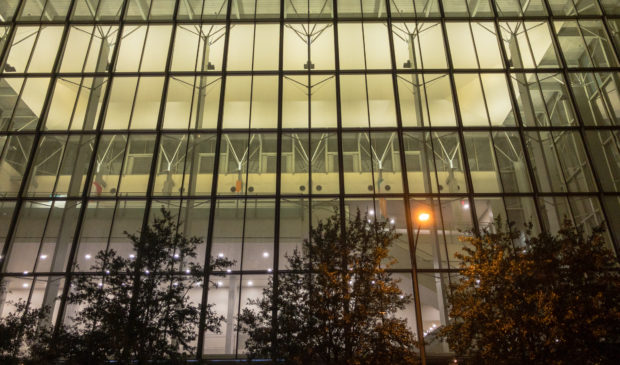Music Commission wants to study pros and cons of expanded convention center
Friday, August 5, 2022 by
Chad Swiatecki Before deciding its position on the proposed expansion of the Austin Convention Center, the Music Commission will form a working group to study details of the project that’s expected to cost up to $1.4 billion. Commissioners voted 7-1 at Monday’s meeting in support of forming the working group, with Commissioner Scott Strickland voting against the move.
The vote came after a presentation about the project from city and convention center staff, who outlined the timetable and major components of the plan that will see the facility torn down and rebuilt over a four-year period.
The Music Commission has a particular interest in the expansion plans because of the possible impact of new convention business that would increase hotel stays and generate more Hotel Occupancy Tax revenue for live music efforts, cultural arts programs and historic preservation.
South by Southwest remains the major building block of local convention business. But hotel and tourism advocates have said for years that the space and infrastructure constraints after the most recent expansion can lead interested event organizers to book elsewhere.
Commissioner Nagavalli Medicharla said convention center staff members need to look for ways to make the proposed expansion beneficial to other parts of the local music industry beyond the positive impact on the city’s Live Music Fund that provides grants to musicians and event promoters.
“South by Southwest brings in significant hotel occupancy into the city, and so one of the ways in my mind to consider this is that expansion of the convention center leads to expansion of South by Southwest or folks coming into town,” she said. “But there are these key music festivals coming into town that are key drivers for bringing in revenue and driving hotel occupancy in the city, and it needs to be looked at from the perspective of how significant is this for music … and the fact that all of this will lead to an expansion of hotel taxes to support music.”
Currently all policy and administrative action related to the expansion is on hold while leaders from Austin Convention Enterprises work to restructure the remaining debt from the most recent expansion to prevent the possibility of default when the facility goes out of operation. Once that deal is complete, the city can issue the request for proposals for design work and construction, which will make the timeline and cost for the project more certain.
Lauryn Gould was among several commissioners who expressed concern over the hefty price tag, given the unpredictability of convention and event business, especially after a multi-year pandemic.
“It sounds like an ‘if you build it they will come’ situation, where if you build more space for conventions, therefore you will have more conventions,” she said. “I’m just wondering if there is data you guys have that shows support for the demand, and that we will actually be able to fill that space with more people, because I’ve gotten some more information that leads me and others to believe there may not be that demand and (event business) may be declining because of the pandemic.”
A 2020 study commissioned by the convention center presented an optimistic picture for future convention business even given the impacts of the Covid-19 pandemic. That view has been countered by some analysts, who see increasing competition from other major cities and a shift toward hybrid events as factors that would make the expansion in Austin a bad business decision.
The westward expansion initially sought by City Council was abandoned because of an impasse in purchase negotiations with landowners, which means the site will have to expand vertically with significant private development in one section to accommodate its use plans.
Strickland and other musicians are concerned about the impact that the convention center and other developments around the city are expected to have on the viability of live music venues in the city’s hot real estate market.
“As a musician that plays music in the city, it’s already increasingly more difficult for musicians to find rooms to play in, and they’re getting more expensive to play in,” Strickland said. “This raises flags in my opinion, and I know a big chunk of why the Live Music Fund exists is because we have the Hotel Occupancy Tax coming from the convention center … but the cost of this very much concerns me because it basically means that bars that are already struggling to stay in the black will have that much more of a difficult time.”
Photo made available through a Creative Commons license.
The Austin Monitor’s work is made possible by donations from the community. Though our reporting covers donors from time to time, we are careful to keep business and editorial efforts separate while maintaining transparency. A complete list of donors is available here, and our code of ethics is explained here.
You're a community leader
And we’re honored you look to us for serious, in-depth news. You know a strong community needs local and dedicated watchdog reporting. We’re here for you and that won’t change. Now will you take the powerful next step and support our nonprofit news organization?








